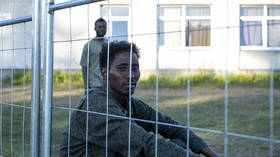Baltic state accused of racially profiling asylum seekers

Lithuania has taken a racially-biased and illegal approach towards refugees from Africa and the Middle East, who poured across its border with Belarus last year, Amnesty International said in a damning report on Monday. Adding that Brussels turned a blind eye to the violations.
Amnesty said it was concerned about “institutional racism embedded within Lithuania’s migration system” after discovering a sharp contrast between the treatment of Ukrainian refugees and those have come from other parts of the world.
“While Lithuania has rightly extended a warm welcome to tens of thousands of people fleeing Ukraine, the experience of the detainees we spoke with could not be more different,” Nils Muiznieks, Europe Regional Director of Amnesty International, said. “This raises serious concerns about institutional racism embedded within Lithuania’s migration system.”
The 65-page report titled “Lithuania: Forced Out or Locked Up” is based on interviews with dozens of people that came from countries including Cameroon, the Democratic Republic of Congo, Iraq, Nigeria, Syria and Sri Lanka. Amnesty said it visited two centers for migrants which were effectively prisons.
The human rights watchdog said it received “numerous reports of ill-treatment, some amounting to torture, and disproportionate use of force” by guards at the two facilities. Detainees complained about being beaten with batons, subjected to taser shocks and bitten by guard dogs. One woman from Sub-Saharan Africa said guards threatened to send her into the forest and hunt her down.
The organization also studied “disturbing video footage” of a police raid on the Medininkai Foreigners’ Registration Center in March, after a protest about poor conditions there. During the raid, black women were forced to walk half-naked into the cold with their hands tied, sexually humiliated and ultimately locked in one of the shipping containers that serve as houses there, it said.
The Kybartai center, another investigated by Amnesty, functioned as a prison until September 2021 and had barbed wire fences and other security measures. The facility was overcrowded and had squalid sinks, toilets and showers, while men kept there were restricted in their movement around the camp. At the Medininkai center, people had to walk across snow to use toilets, the report said.
In August 2021, Lithuania passed emergency legislation in response to the migration crisis at its border with Belarus, which it, together with the EU as a whole, blamed on Minsk. Thousands of asylum seekers were violently pushed back into Belarus, while hundreds were detained. The new rules allowed Lithuania to automatically arrest all irregular migrants and keep them locked up for a year, without reviewing or even accepting their asylum applications, the report said.
Lithuania offered inadequate legal assistance to the refugees, Amnesty pointed out. Lawyers representing them are hired by the same Migration Department, whose decisions they are supposed to challenge. The group called the arrangement a “sham” due to the obvious conflict of interest.
“A year after Lithuania tried to legalize the illegal, the European Commission still has not taken any action to bring Lithuania’s legislation into line with EU law,” Nils Muiznieks commented “For as long as the European Commission stands idle, it sends a message to member states that EU laws can be violated with impunity.”













